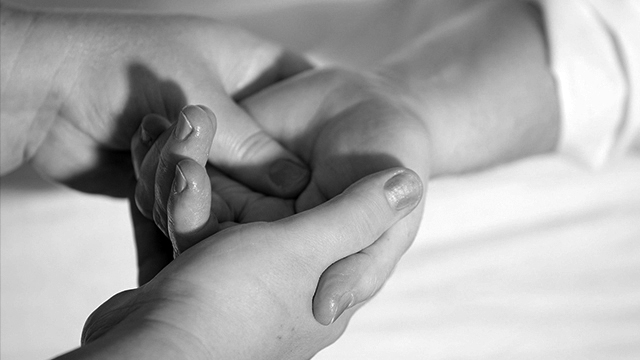More touch. More humanity.
Conscious touch is perhaps the most healing response to the greatest challenges of our time. Stress, pressure to perform, uncertainty, and emotional exhaustion alienate us: from ourselves, from others, from happiness. We are missing something—physically, emotionally, socially. Touch can fill this void. It gives us security, trust, and a sense of connection. It brings us back to our senses, lets us feel the pulse of life again, and stand in the world with alert presence. It is time for a new culture of touch that allows us to be more human again in a simple, natural way.
The world is at a turning point: digitalization, wars, social tensions, and global uncertainties are shaping our everyday lives more than ever before. These developments are not only affecting politics and the economy—they are deeply affecting our bodies, our souls, and our social interactions. With far-reaching consequences. The constant stress, the omnipresent friction in both small and large interactions, the never-ending flood of negative information: all of this is wearing many people down. Important foundations of normal life are shaking or crumbling. Overwork, exhaustion, frustration, and uncertainty are spreading. It is becoming increasingly difficult to look to the future with optimism, and more and more people are suffering as a result, on all levels: physically, mentally, and emotionally. Health is no longer just a question of medical care, but a question of personal lifestyle and attitude. Today, well-being requires active personal responsibility—and touch plays a key role in this.
WE ARE MADE TO BE TOUCHED
Because human beings are, by nature, creatures that need touch. True satisfaction, connection, and recognition only arise when we have been touched in a lasting way. Through special experiences. Through special moments. Through other people. Through words. Through music. Through art. Through a ray of sunshine. Through a child’s laughter. Through a warm hug. Through conscious and mindful physical contact. If we are not touched by life on a deep level, most experiences taste like salad without dressing. The crucial ingredient is missing to flatter the soul and the heart, to truly satisfy them. The salad may be a great success, a major milestone in life, but without the aspect of touch, enjoyment, joy, and fulfillment are missing. And we continue to languish. And we continue to search. Over and over again. The hamster wheel of dissatisfaction. This personal deficit of closeness is not an individual fate, but reflects a global development. But why is touch so essential here in particular?
TOUCH IS OUR ORIGIN
Being touched is one of the most important and most underrated basic needs. The first sense to develop in the womb is the sense of touch. Even before we can see, hear, or smell, we feel. The sense of touch is our first sensory window to the world, and the skin—as our largest organ—becomes a map of our first experiences: the gentle flow of amniotic fluid, the umbilical cord brushing against the body, our own little hand finding its way to our mouth. These touches are our first form of communication, and it is no coincidence that the sense of touch awakens before all other senses. It is already there in the womb to convey information to us, to calm us, to connect us. And after birth, it is the most important anchor for the newborn: the feeling of skin on skin calms the heartbeat, stabilizes breathing, and strengthens the immune system. Physical touch conveys the message: You are safe. You are welcome. You are. This nourishes and creates trust. Trust in yourself. Trust in life. Without this form of affection, newborns can wither physically and psychologically. And without a sense of security and trust, the development of personality is on shaky ground: basic trust versus basic fear. Touch builds a solid foundation for all further steps.
But the importance of the sense of touch does not end with childhood. Throughout our lives, it remains the key to closeness, belonging, and comfort. Touch can reduce anxiety, relieve pain, and relieve the circulatory system. Touch teaches us closeness, distance, boundaries, and openness. Touch gives us security and orientation. Touch helps us get in touch with core values and the most important building blocks of our personality. And it helps us connect with others. Because touch is not only our first means of communication, it is also our oldest—it is more direct than words and clearer than looks. The language of touch accompanies us throughout our lives. It is the bridge between our inner world and the outside world—from our first heartbeat to our last breath. When we lose it, we lose part of what makes us human. In a world that increasingly separates us from one another, the sense of touch reminds us that we are designed to connect. Without connection, we are lost. We lose ourselves, we lose our meaning, and we are exposed to the storms of life without any real support. That is why our bodies and souls are programmed to seek touch again and again. And the language of the skin reminds us that we are not just thinkers or doers—we are primarily feelers. That is why humans can certainly be described as touch beings.
Nevertheless, we have banned the many small points of contact of physicality from our everyday lives. Touch has lost its innocence, especially since the pandemic. However, we should start to rethink this: we need a culture in which touch is not stigmatized, tabooed, sexualized, or avoided, but valued, learned, cultivated, and lived. A culture in which touch is not seen as a weakness, but as a skill. A culture in which we are allowed to feel again – ourselves and each other. Touch is not a luxury, but essential. However, there is much more at stake here. It is about individual and collective health. In the coming years, five key challenges and trends will emerge that will have a major impact on our physical, mental, and social well-being…
THE CHALLENGES
- Digital exhaustion and physical disconnection:Constant availability, screen time of up to ten hours a day, lack of exercise, and the increasing virtualization of everyday life are leading to a loss of body awareness. People are forgetting how to feel themselves. Chronic tension, sleep disorders, eye problems, and exhaustion are rapidly increasing. Digitalization brings convenience—but also alienation from our own bodies.
- Mental stress caused by a high density of crises:Pandemics, wars, economic uncertainty, climate crises—the density of global challenges is causing many people to be in a state of permanent inner alert. According to the WHO, anxiety disorders, depression, and burnout will be among the most common clinical pictures in the coming years. The psyche is overwhelmed by constant stress – and the lack of stable, nourishing contacts exacerbates the problem.
- Loneliness as a silent pandemic:Social isolation is increasing dramatically, especially in Western societies, across all age groups. More and more people are living alone, without regular contact or interpersonal warmth. Studies show that loneliness is harmful to health. It attacks the cardiovascular system, promotes dementia, and weakens the immune system. And yet it is still given too little attention by society.
- Devaluation of intimacy and closeness:In a world full of fast stimuli and digital distractions, deeper forms of closeness and intimacy are losing their meaning. Physical contact is often sexualized or viewed with suspicion. At the same time, there is a growing longing for genuine connection—but there is a lack of cultural spaces where touch can be learned and experienced as an expression of compassion, respect, and human warmth.
- Loss of self-regulation:Stress, information overload, and constant emotional demands cause many people to lose the ability to regulate themselves. Access to inner peace, calm, and a healthy body image becomes more difficult. New forms of education and practice are needed that not only impart knowledge but also promote self-awareness, resilience, and emotional competence.
TOUCH CULTURE AS AN ANSWER
What if we saw these challenges not only as threats – but as questions? Questions about our culture, about how we interact with each other, about what we really need? This is precisely why we need a new form of touch culture: as an answer to these questions. Touch—mindful, respectful, conscious—should once again be at the center of our humanity. Not as a technique, but as an attitude. As a lived connection between body, soul, and community. Why?
- Return to the body:Feeling instead of scrolling. Touch brings us right back to the moment—to the presence of the body. It breaks through the digital autopilot. Whether through shiatsu, conscious hugs, or simple gestures of contact, when we are touched, we feel ourselves. The culture of touch promotes a reconnection to the body—as a counterweight to the increasing virtualization of life. It reminds us that health begins with embodiment.
- Touch as an anchor in uncertain times:Mindful touch acts like an inner anchor. It calms the nervous system, lowers stress hormones, and builds trust. In a world full of uncertainty, physical affection can provide stability – regardless of words or external solutions. The culture of touch offers space for these healing contacts – in therapeutic settings as well as in everyday life.
- Closeness against loneliness:The culture of touch creates spaces where closeness becomes natural again – beyond shame or misunderstanding. It aims to establish a new social practice in which people once again treat each other with openness, mindfulness, and respect. In families, among friends, in care, in educational institutions. Where touch is lived, relationships develop. And where relationships grow, loneliness disappears.
- A new ethic of touch:The touch culture does not view touch as a private matter, but as a cultural competence. It aims to help develop a new understanding of closeness – beyond mistrust or aggression. Mindful touch is not an assault, but a gift. The movement stands for a conscious approach to physical contact: clear, respectful, human. This creates a new way of being together.
- Self-regulation through mindful practice:Those who regularly experience mindful touch strengthen their ability to perceive themselves – and thus to regulate themselves. The slow, present touch in Shiatsu or other manual methods activates the parasympathetic nervous system – the system for regeneration and inner balance. The culture of touch promotes these processes – as practical health education for body and soul.
LET YOURSELF BE TOUCHED MORE
For me, the culture of touch is much more than an idea – it is an invitation to proactively take control of the challenges of our unique times and rethink humanity. Not as an abstract value, but as a tangible experience. Many small gestures in everyday life can contribute to this. Whether it’s allowing small points of contact or hugs. And of course, body-centered forms of treatment can also make a significant contribution to rediscovering and experiencing touch. Shiatsu, for example. That is my background, my passion.
Shiatsu is a form of massage. But in Shiatsu, it’s all about the type and quality of touch. Shiatsu touches not only the body, but always the whole person. Every touch follows the breath, feels, senses, hears between the lines. Shiatsu practitioners experience every day how people can regain access to themselves through this special form of mindful touch and how this can initiate a healing process on all levels. This is not a technique—it is relationship in motion. Shiatsu is a living culture of touch.
Methods such as Shiatsu should find a prominent place in our society, as they provide a constructive response to the most pressing challenges of our time. Methods such as Shiatsu are a valuable bridge that connects body and mind and does not view problems in isolation. And that is exactly what we need. Now.
ONE MILLION TOUCHES
My goal is one million touches. Of course, I can’t do this alone. I need your help as someone who is connected to Shiatsu. How can we invite as many people as possible to become part of this culture?
– Share and spread the importance of touch. We need daily physical contact as food for the soul. It’s not about Shiatsu, it’s about raising awareness of the need to let ourselves be touched more again. I’m starting a campaign about touch culture at www.facebook.com/InternationalHaraShiatsuInstitute—why not be a part of it?
– How can we achieve a million touches together? Maybe you have an idea how we could record and communicate this? I would love to hear your creative ideas and suggestions 😉
Ultimately, it’s in our hands. It’s up to us to make something beautiful out of this. Let’s touch the world together – in the most literal sense. Every touch counts. Join us…






